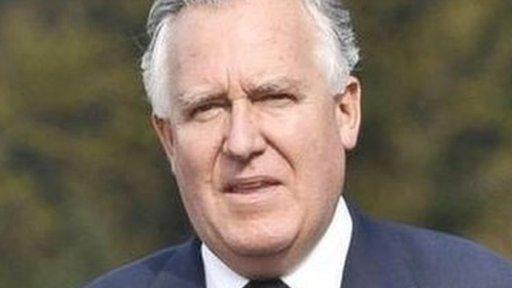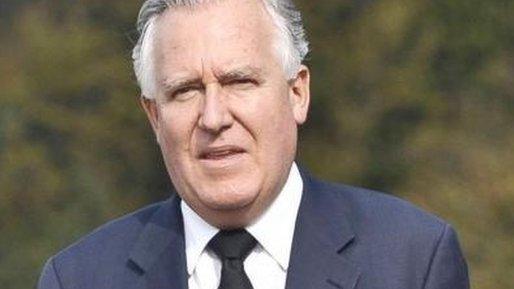Peter Hain: Historic Troubles trials give victims false hope
- Published

Peter Hain was Northern Ireland secretary from 2005 until 2007
Pursuing prosecutions for historic Troubles killings is only leading victims down a false path, a former NI secretary of state has said.
Labour MP Peter Hain said evidence could not be retrieved in 90% of cases.
More than 3,000 killings carried out during the 30-year conflict remain unsolved.
Mr Hain, who was Northern Ireland secretary from 2005 to 2007, urged politicians to overcome differences and agree a new way forward.
"Northern Ireland's politicians need to have the courage to agree a new approach and move on from the past of horror and evil, or their society will keep getting dragged dangerously back to it," he said.
His comments, which are outlined in full in an article published in Progress magazine on Friday, come as politicians continue to wrangle over stalled proposals for dealing with outstanding peace process issues drafted by former US diplomat Richard Haass.
While Dr Haass's blueprint envisages the continuation of historic investigations through a new police unit, it also proposes the creation of an independent commission for information retrieval (ICIR) for those victims searching for the truth of what happened to their loved ones, even though justice has proved out of reach.
Such a body would encourage those involved in killings to provide details with the assurance that their revelations could not be used against them in a court of law.
Not amnesty
Last year, Northern Ireland Attorney General John Larkin triggered intense debate when he suggested an end to Troubles-related prosecutions pre-1998.
Mr Hain has backed that call, but has insisted such a policy would not amount to an amnesty.
He said that despite political progress since the 1998 Good Friday Agreement, the past continued to "haunt" Northern Ireland.
The Neath MP and other Labour colleagues have come in for criticism in recent times for some of the compromises struck during the peace process, most notably over the deal with Sinn Féin that saw the government send letters to so-called on-the-run republicans informing them if they were not wanted by police.
Mr Hain, who has criticised the current government's level of engagement in Northern Ireland, rejected any suggestion the Labour administration had "sidelined" victims, pointing to a number of initiatives he said were undertaken to help them, including the commissioning of the 2009 Eames Bradley report on the past.
"There will never be a way of dealing with the past that will satisfy everyone," he said.
"But there can be mechanisms put in place to acknowledge and recognise the suffering of thousands of people which both Eames-Bradley and Haass set out."
He said practical proposals, such as a pension for those severely injured in the conflict, should be introduced.
'Completely disengaged'
"But what it needs above all is the political will to deal with the issues in a compassionate, humane, comprehensive and inclusive way and not to be stuck with 'our' victims and 'their' victims across the divide," he said.
He added: "It is no answer to pursue prosecutions for Troubles-related crimes, especially when, in 90% of these cases going back 40 years or more, the evidence cannot be retrieved.
"That is simply leading victims down a false path when they need redress and justice in another way, as suggested by Eames-Bradley and Haass, joined, intriguingly, last year by Northern Ireland's attorney general John Larkin."
Mr Hain said the "fiasco" of Gerry Adams' recent detention over the 1972 murder of Belfast mother-of-10 Jean McConville illustrated the "problem of the current vacuum". Mr Adams, who denies any involvement, was released pending a police file being sent to prosecutors.
He also questioned the logic of prosecuting the British soldiers involved in Bloody Sunday in Londonderry in 1972.
"If they are put on trial when unsolved paramilitary crimes cannot be prosecuted, what sort of even-handed justice is that?" he asked.
- Published7 April 2014

- Published20 November 2013
